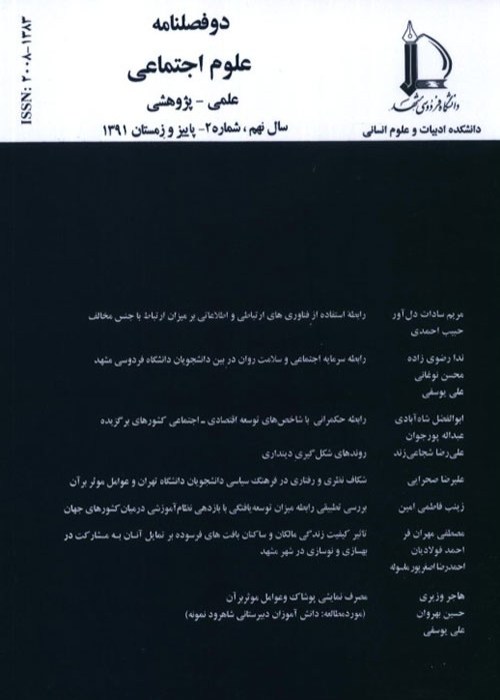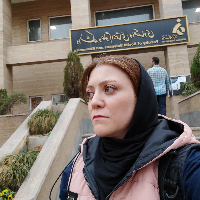Religion and Social Health: The Relationship between Religiosity and Social Health (A Case study of the Students of Payam-e Noor University, Marand)
Author(s):
Abstract:
Introduction
Health is a reflection of the condition of community members, which is affected by a complex set of biological, psychological, social, cultural, economic, religious and political factors. One of the basic and important themes of health assessment in different communities that plays an important role in dynamism and efficiency of every society is social health of community which is the function of social and cultural factors. Social health returns to personality of individual and it involves individual's assessment of community and the quality and quantity engaging in the community.Today, many cultural - social factors are affected on the health of individuals which one of these factors is religious (belonging, commitment and religious orientation). With regard to the consequences and functions of religion in personal and social level, it was one of the most decisive factors in shaping and directing the human community and plays an important role in establishing and maintaining social structures and human social life.
Hence, the present study aims to examine the relationship between religiosity and social health from Sociological perspective. The aim of this study was to determine the relationship between religiosity and social health among the students of Payam Noor University of Marand and tries to answer these questions: What is the rate of the religiosity and social health of students? And what is the relationship between the rate of religiosity and social health of the students?
Theoretical Framework: Keyes (2004), knows social health as assessment and recognition of how they operate in the community and the quality of relationships with other people, relatives and members of social groups. He enumerates five criteria for social health, including social integration, social contribution, social acceptance, social actualization and social coherence.
Durkheim (1951) believes that the potential benefits of public life is solidarity and social coherence, that is, a sense of belonging and association, understanding the common knowledge and a common destiny. These advantages of social life are a basis for global and overall definition of social health. According to the Durkheim's view, in groups and societies that religion is widespread, probably individuals have more consistency with society they receive more social support from the community and as a result they have better health. Also, functionalist theorists such as Davis, Yyngr, and Eddie (1964) believe that religion has an inevitable and unique role in the development of integration and social coherence. Religion unites society, strengthen social solidarity and maintains the social coherence. Also, it strengthens the unity of members of society and provides the background of group integration. Religion with creating a collective spirit, religious enthusiasm and spreading public feelings from rites and ceremonies can provide the context to provide the link between members and social coherence.
Methodology
This study was conducted with a sample size consisting of 345 subjects and data were gathered via stochastic sampling among students of Payam-e Noor University of Marand. The instrument used for data collection in this study is religiosity questionnaire of Glark and Stark and social health of Keyes.Validity of questionnaire was evaluated using face validity. Assessment of reliability of questionnaire using Cronbach's alpha revealed that the coefficient for dependent variable (social health) was 0.72 and for independent variable (religiosity) was 0.79. Using SPSS 19 software, the questionnaire data were analyzed.Results and Discussion
The results of the Pearson correlation coefficient showed that there is a direct and significant relationship between religiosity and social health of students and also the main aspects of the societal health (Social Integration, Social Contribution, Social Acceptance, Social Actualization, Social Coherence). The highest correlation coefficient related to the social integration and the minimum correlation refer to social actualization. Social health of students is significantly different in terms of their gender, but this difference is not significant with other demographic variables (marital status, social class). There is no significant relationship between age and social health either. Results of two-variable regression analysis showed that religiosity affects social health about 27.3 percent.Suggestions: In conclusion, the empirical findings confirmed most of the hypotheses of the study. The results of this study indicate that there is a mutual relationship between religiosity and social health, and that increasing the amount of religiosity causes social health. Religiosity has more implications on social integration than other dimensions, which is in line with Durkheim's theory and functionalist theorists, who believe that religion plays an essential and unique role in promoting integration, social cohesion and the preservation of social cohesion. Therefore, despite their differences, rituals and religions led to increased solidarity and social coherence of people, and religiosity, as an important structure in human life, plays a key role in increasing human health, and social health in particular.
Keywords:
Language:
Persian
Published:
Journal of Social Sciences, Volume:12 Issue: 2, 2016
Pages:
137 to 168
magiran.com/p1563535
دانلود و مطالعه متن این مقاله با یکی از روشهای زیر امکان پذیر است:
اشتراک شخصی
با عضویت و پرداخت آنلاین حق اشتراک یکساله به مبلغ 1,390,000ريال میتوانید 70 عنوان مطلب دانلود کنید!
اشتراک سازمانی
به کتابخانه دانشگاه یا محل کار خود پیشنهاد کنید تا اشتراک سازمانی این پایگاه را برای دسترسی نامحدود همه کاربران به متن مطالب تهیه نمایند!
توجه!
- حق عضویت دریافتی صرف حمایت از نشریات عضو و نگهداری، تکمیل و توسعه مگیران میشود.
- پرداخت حق اشتراک و دانلود مقالات اجازه بازنشر آن در سایر رسانههای چاپی و دیجیتال را به کاربر نمیدهد.
In order to view content subscription is required
Personal subscription
Subscribe magiran.com for 70 € euros via PayPal and download 70 articles during a year.
Organization subscription
Please contact us to subscribe your university or library for unlimited access!




